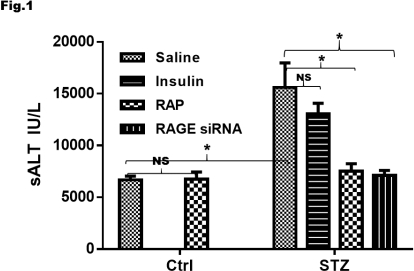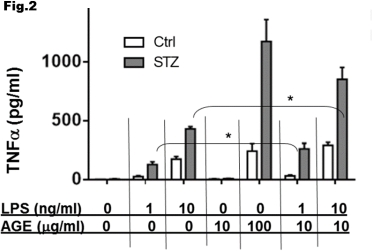Diabetes Exacerbates Liver Ischemia and Reperfusion Injury By Activating the AGE-RAGE Pathway in Kupffer Cells
S. Yue, J. Zhu, J. Rao, J. Kupiec-Weglinski, R. Busuttil, Y. Zhai.
Surgery, UCLA, Los Angeles, CA.
Meeting: 2015 American Transplant Congress
Abstract number: D92
Keywords: Hyperglycemia, Ischemia, Liver preservation, Metabolic complications
Session Information
Session Name: Poster Session D: Innate Immunity in Transplantation
Session Type: Poster Session
Date: Tuesday, May 5, 2015
Session Time: 5:30pm-6:30pm
 Presentation Time: 5:30pm-6:30pm
Presentation Time: 5:30pm-6:30pm
Location: Exhibit Hall E
Although pre-transplant diabetes has been documented as a risk factor for mortality post-liver transplant, the underlying mechanism remains obscure. In a murine liver partial warm ischemia model with streptozotocin-induced type I diabetes, we addressed the question of how diabetes impacted tissue inflammatory injuries against ischemia reperfusion (IR). Our results show that diabetic mice (STZ group) developed exacerbated liver IR injury (IRI), accompanied by hyper-inflammatory immune activation, which was resistant to the insulin treatment (Fig.1). Kupffer cells (KCs), but not hepatocytes, from diabetic mice expressed significantly higher levels of receptor for advanced glycation end products (RAGE), which not only enhanced their response to lipopolysaccharide (LPS), but also enabled them to respond to advanced glycation end products (AGEs) stimulation in vitro. In fact, these RAGE positive macrophages could be activated synergistically by low doses of AGE and LPS (Fig.2). In vivo, diabetes increased AGE levels in livers. Liver IR triggered serum AGE release in diabetic, but not normal, mice. RAGE-targeted therapies of either its antagonist peptides or small interfering RNA effectively reduced liver IRI and diminished local inflammatory immune activation in diabetic, but not normal, mice (Fig.1). Our results demonstrated that diabetes resulted in the activation of the AGE- RAGE signaling pathway in KCs in response to IR, leading to liver hyper-inflammatory immune response and exacerbated hepatocellular injury. 

To cite this abstract in AMA style:
Yue S, Zhu J, Rao J, Kupiec-Weglinski J, Busuttil R, Zhai Y. Diabetes Exacerbates Liver Ischemia and Reperfusion Injury By Activating the AGE-RAGE Pathway in Kupffer Cells [abstract]. Am J Transplant. 2015; 15 (suppl 3). https://atcmeetingabstracts.com/abstract/diabetes-exacerbates-liver-ischemia-and-reperfusion-injury-by-activating-the-age-rage-pathway-in-kupffer-cells/. Accessed February 17, 2026.« Back to 2015 American Transplant Congress
